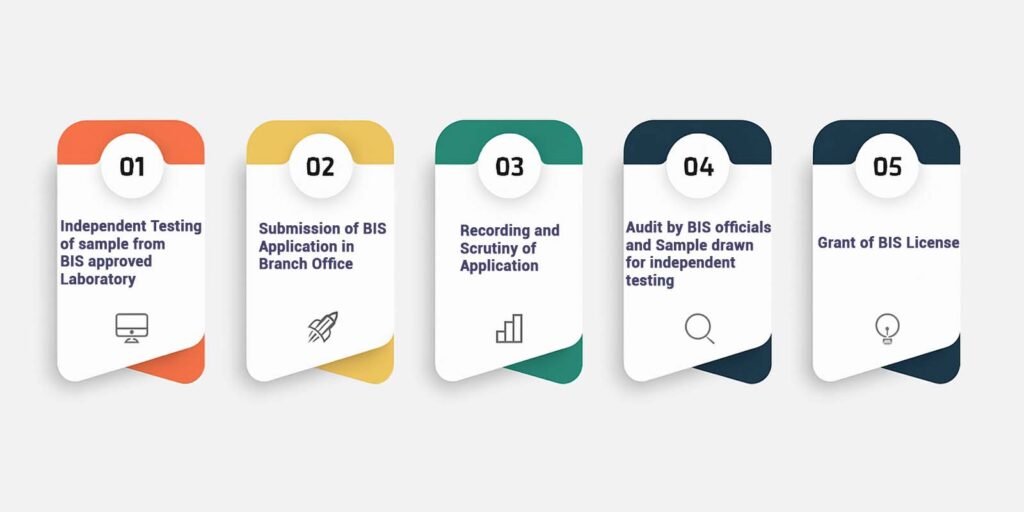The hair oil market represents a fundamental category within India’s cosmetic and personal care sector where millions utilize these products for scalp nourishment along with hair health maintenance. The Bureau of Indian Standards established distinct regulations under IS 7123:1993 to maintain these products’ safety quality and consistency. Entities producing or importing hair oils need to secure BIS certification to meet Indian regulatory standards and build consumer confidence. This blog will explore the BIS certification for hair oils including its significance necessary documentation and methods for achieving certification without complications.
What is BIS Certification?
BIS Certification represents a conformity assessment scheme which the Bureau of Indian Standards operates as India’s national standards body. The system verifies that products meet Indian Standards to guarantee safety, along with performance and quality.
BIS certification status as mandatory or voluntary depends on the product category along with any government-issued Quality Control Orders (QCOs). The certification process for hair oils remains a voluntary practice yet it stands as highly recommended.
Read More: Introduction To Bureau Of Indian Standards
Is BIS Certification Mandatory for Hair Oils?
As of now, BIS certificate for hair oils is not mandatory, since the Ministry of Consumer Affairs has not yet issued a Quality Control Order (QCO) for this category. However:
- BIS certification is not currently mandatory for hair oils.
- Compliance with IS 7123 is voluntary but recommended.
- Future regulations may make it compulsory.
- Cosmetic laws on labeling and safety still apply.
Scope of IS 7123:1993 – Specification for Hair Oils
IS 7123:1993 lays down the following technical and quality parameters:
- Physical appearance (clarity, colour, odour)
- Refractive index
- Saponification value
- Acid value
- Iodine value
- Unsaponifiable matter
- Presence of mineral oil
- Limit for heavy metals and harmful substances
- Microbiological limits
It applies to all types of hair oils including:
- Coconut oil-based hair oils
- Amla hair oil
- Herbal and Ayurvedic hair oils
- Perfumed or non-perfumed oils
- Blended or fortified hair oils
Benefits of BIS Certification for Hair Oils
Below, we mentioned benefits of BIS Certificate for hair oils:
- Consumer Confidence: ISI mark ensures the product meets Indian quality norms
- Competitive Advantage: Helps distinguish the product in a saturated FMCG market
- Export Compliance: BIS-certified products are often favored for international trade
- Legal Safety: Shows compliance with quality norms in case of regulatory inspections
- Access to Govt Tenders: Many public procurement tenders require BIS certification

Step-by-Step process for BIS Certification for Hair Oils
Below we mentioned full process for BIS certificate for hair oils:
Step 1: Identify the Relevant Standard
Confirm that your product falls under IS 7123:1993. Review the scope and ensure formulation compliance.
Step 2: Application Filing
Apply for certification on the BIS Manak Online Portal. Submit Form V and pay the application fee.
Step 3: Product Testing
Send samples of your hair oil product to a BIS-approved laboratory for testing. Tests will check for:
- Purity
- Mineral oil content
- Acid and saponification values
- Safety from contaminants
Step 4: Factory Audit
BIS inspectors visit your production site to evaluate:
- Good Manufacturing Practices (GMP)
- Testing labs and equipment
- Quality control processes
- Record maintenance and traceability
Step 5: Grant of License
If your product passes lab testing and your factory meets BIS audit standards, you will receive the ISI certification for your hair oil product.
Read More: Process for getting BIS for Certification
Documents Required for BIS Certification of Hair Oils
| Document Type | Description |
|---|---|
| Company Registration | Certificate of Incorporation, GST, PAN, IEC (if exporter) |
| Manufacturing Details | Production flow chart, equipment list, GMP details |
| Product Information | Ingredient list, labelling samples, formula sheet |
| Test Reports | BIS-recognised lab test reports as per IS 7123:1993 |
| Internal Quality Policy | Quality control and testing procedures |
| Factory Location Documents | Rent/lease agreement, site layout map |
| Authorised Signatory Proof | Authorisation letter, ID proof, board resolution if applicable |
Read More: Documents Required For BIS Registration
Fees & Cost Breakdown
| Fee Component | Approximate Amount (INR) |
|---|---|
| Application Fee | ₹1,000 to ₹5,000 |
| Testing Fee | ₹15,000 to ₹40,000 (varies by formulation) |
| Factory Inspection Fee | ₹7,000 to ₹10,000 |
| Annual Marking Fee | ₹10,000 to ₹25,000 |
| Renewal Charges | As per number of years & units certified |
Note: These are estimated figures and can vary based on product variants and lab fees.
Renewal and Surveillance
After grant of BIS license, you must:
- Conduct routine product testing and maintain internal test records
- Allow BIS surveillance audits annually
- Submit samples for market surveillance testing
- Apply for renewal before license expiry (typically every 1-2 years)
Non-compliance can result in suspension or cancellation of the license.
Role of Consultants in BIS Certification for Hair Oils
Working with an experienced consultant can BIS Certificate for Hair Oils can ease the process by:
- Interpreting the standard requirements (IS 7123:1993)
- Preparing technical files and documentation
- Coordinating with labs and BIS officials
- Supporting with product testing and audit readiness
- Ensuring timely renewal and compliance
This helps avoid costly delays or rejections and ensures smooth certification.
How ELT Corporate Can Help You
At ELT Corporate, we specialise in providing end-to-end assistance for BIS certification of toothpaste, including
- Document preparation
- Lab coordination
- BIS portal submission
- Factory inspection support
- Liaison with BIS officials
Whether you are a domestic brand or a global exporter, we ensure fast-track BIS certification with complete legal compliance.
Get in touch with our experts today and simplify your certification journey!
Conclusion
Though voluntary at present, BIS certificate for hair oils under IS 7123:1993 has become a valuable symbol of quality and safety. Manufacturers and brands can greatly benefit from ISI certification in building trust, accessing new markets, and aligning with future regulatory shifts. By complying with BIS norms, you ensure that your product meets both customer expectations and national safety benchmarks.
Whether you’re a large-scale manufacturer, a private label brand, or an exporter, investing in BIS certification for your hair oil products can set you apart in a competitive market.
Is BIS certification mandatory for coconut hair oil?
No, it is not mandatory currently. However, certification under IS 7123:1993 is available on a voluntary basis.
What happens if I falsely use the ISI mark?
Misuse of the ISI mark without a valid license is punishable under BIS Act, 2016, and may attract penalties including prosecution.
Can imported hair oils be BIS certified?
Yes, but importers must obtain a CDSCO cosmetic import license and follow the BIS Foreign Manufacturers Certification Scheme (FMCS).








